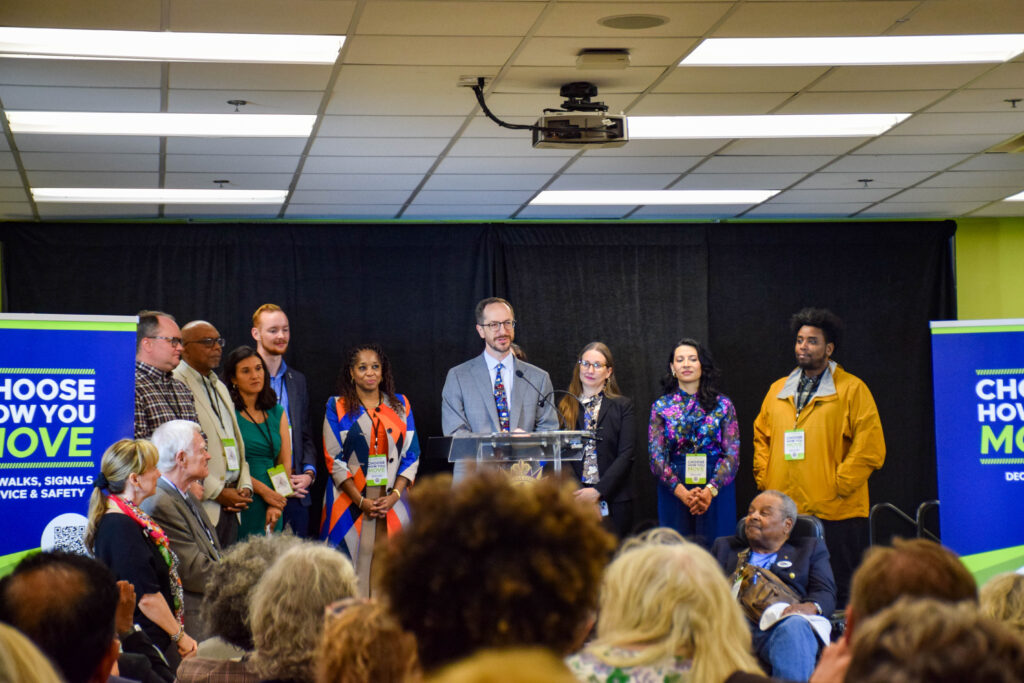
Nashville’s transit referendum proposes increasing one tax — the sales tax — to pay for a more robust transportation network. But, given the regressive nature of the sales tax, the choice has raised some equity concerns.
In 2018, the last time Nashville considered a transit referendum, officials tried to raise four different taxes. This became a sticking point for some opponents, and voters resoundingly rejected that package.
This time, the thinking is different. Advisors warned against multi-tax approach, questioning whether more taxes would win the necessary support.
“Is the juice worth the squeeze?” Amanda Vandegrift, a transit specialist who consulted on the proposal, told the technical advisory committee earlier this year. “My assessment was it wasn’t.”
The mayor’s administration took the advice, and this time around, it’s just the sales tax. O’Connell is proposing a half-cent increase, which would raise the local sales tax rate to 2.75% from its current 2.25% (that’s in addition to the 7% Tennesseans already pay toward the state.) The majority of Davidson County’s surrounding counties — Robertson, Rutherford, Williamson and Wilson counties — are already at the maximum 2.75% local rate.
Leaders have cited a number of reasons for selecting the sales tax: its large revenue potential, its reliability, and its ability to draw funds from tourists.
“It’s one of the highest revenue generators,” Michael Briggs, the mayor’s transportation advisor said. “In terms of something that’s longer-term and consistent over the life of the program, the sales tax was something that was high up on the list.”
Dr. Kara Smith, the department chair of economics at Belmont University, echoed Vandegrift’s assessment, saying the sales tax might be an easier political sell than raising an array of different taxes all at once.
“It’s a tax that we already know, we’re already familiar with, we already don’t like. And it’s a marginal change. Maybe that makes for an easier pill to swallow,” Smith said. “Even if those other four taxes wouldn’t impact the average household as much, it just sounds more difficult to say there’s more taxes being raised.”
Still, there are concerns about who is footing the bill.
Sales tax is a regressive tax — meaning the less money an individual makes, the more burdensome the tax feels.
“They’re probably spending all of their income on the needs of their household,” Smith said. “But if you make half-a-million a year in your household, you’re not spending all of your income on necessities. So, the actual percentage of your income that goes to the tax would be lower.”
Yet the very thing that makes a sales tax regressive is also what makes it attractive to the city as a funding source.
“People cannot opt out of buying their necessities, right?” Smith explained. “And, in particular, with a grocery tax, it’s incredibly regressive, but in a sense also so stable and reliable because it’s the one thing we absolutely cannot get out of spending.
Some measures could be taken to offset the impact.
On the day the transit plan was unveiled, the local group Nashville Organized for Action and Hope canvassed the room, passing out flyers that called upon the mayor’s administration to adopt certain provisions.
These requests, in reaction to the regressive nature of sales tax, included items that could help mitigate the burden on low-income earners. They included ideas like free bus passes for people earning below a certain amount, elimination of the local grocery sales tax and reduced or free bus passes for Metro and MNPS employees.
Already, the city allows MNPS high school students to ride for free. And, the administration is considering several of the ideas. Included in the plan are free fares for low-income earners (qualified through existing nutrition or housing assistance criteria) and new bus shelters in marginalized areas. And, if the referendum is approved this November, they say they are open to more accommodations down the line.
Briggs says the administration has also discussed grocery sales tax elimination. “It’s something that’s on the table that we could continue to explore,” Briggs said. “We’re not shutting any door.”
The transit referendum was approved by Nashville’s Metro Council earlier this month. It will require a sign-off from the Davidson County Election Commission before appearing on the Nov. 5 ballot.

